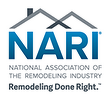
National Association of the Remodeling Industry
National Association of the Remodeling Industry - www.nari.org
Displaying 576 - 583 of 583 results.
FIRST PREV [476-500] [501-525] [526-550] [551-575] [576-583] LAST

 Choosing the correct roofing materials is a critical first step for builders, architects, and designers as they construct a new building, and for facility managers who work with these professionals to remodel existing buildings. This program examines SBS modified bitumen roofing and underlayment systems and includes discussions on the properties of SBS modified bitumen membrane, applications, testing, codes and standards, and underlayments, and provides a comparison with other commercial roofing materials.
Choosing the correct roofing materials is a critical first step for builders, architects, and designers as they construct a new building, and for facility managers who work with these professionals to remodel existing buildings. This program examines SBS modified bitumen roofing and underlayment systems and includes discussions on the properties of SBS modified bitumen membrane, applications, testing, codes and standards, and underlayments, and provides a comparison with other commercial roofing materials.

https://redirect.aecdaily.com/s498466/www.aecdaily.com/course/901875
This course is ONLINE: SELF-PACED. Experience it on your own schedule, at your convenience.

 Bamboo is a versatile, strong material with a warm aesthetic that suits an array of interior design styles. This course looks at how bamboo is sustainably sourced to produce low-VOC products such as flooring, cladding, and three-ply architectural wall and ceiling panels. Project examples highlight a CNC routing method that produces panels with eye-catching patterns of varying depths and levels of intricacy. The course also examines how bamboo products may apply to several credits and features in the LEED® v4.1 Building Design and Construction and Interior Design and Construction rating systems and the WELL Building Standard™ version 2.
Bamboo is a versatile, strong material with a warm aesthetic that suits an array of interior design styles. This course looks at how bamboo is sustainably sourced to produce low-VOC products such as flooring, cladding, and three-ply architectural wall and ceiling panels. Project examples highlight a CNC routing method that produces panels with eye-catching patterns of varying depths and levels of intricacy. The course also examines how bamboo products may apply to several credits and features in the LEED® v4.1 Building Design and Construction and Interior Design and Construction rating systems and the WELL Building Standard™ version 2.

https://redirect.aecdaily.com/s1062476/www.aecdaily.com/course/1081226
This course contains sustainable design information. See the course details page for more information.
This course is part of one or more "Course Collections". Click here to view the details.
This course is ONLINE: SELF-PACED. Experience it on your own schedule, at your convenience.

 Designing restrooms to allow for and maximize proper hygiene is important in reducing the spread of germs. This course discusses the elements of hygienic restroom design and how reducing required touchpoints helps to increase safety and cleanliness. The key steps in proper hand hygiene are also discussed. The course then focuses on hand dryers and considers their impact on hand hygiene and sustainability. The future of commercial restroom design is then explored.
Designing restrooms to allow for and maximize proper hygiene is important in reducing the spread of germs. This course discusses the elements of hygienic restroom design and how reducing required touchpoints helps to increase safety and cleanliness. The key steps in proper hand hygiene are also discussed. The course then focuses on hand dryers and considers their impact on hand hygiene and sustainability. The future of commercial restroom design is then explored.

https://redirect.aecdaily.com/s5712/www.aecdaily.com/course/946869
This course contains sustainable design information. See the course details page for more information.
This course is ONLINE: SELF-PACED. Experience it on your own schedule, at your convenience.

 Color palettes and design styles are cyclical and constantly moving. Change is inevitable. This course highlights significant events in US history and predominant movements in design and architecture to illustrate how color trends are threaded throughout history.
Color palettes and design styles are cyclical and constantly moving. Change is inevitable. This course highlights significant events in US history and predominant movements in design and architecture to illustrate how color trends are threaded throughout history.

https://redirect.aecdaily.com/s5089/www.aecdaily.com/course/986116
This course is ONLINE: SELF-PACED. Experience it on your own schedule, at your convenience.

 Precast concrete pavers and roof deck systems enable designers to deliver on aesthetics and design objectives while achieving safety and durability requirements. Patented roof deck systems allow for the creation of safe and stable roof deck patios and green roofs that maintain sustainability requirements. This course examines the raw materials used in these systems, reviews the different finishes available, and discusses different paver applications and their methods of installation.
Precast concrete pavers and roof deck systems enable designers to deliver on aesthetics and design objectives while achieving safety and durability requirements. Patented roof deck systems allow for the creation of safe and stable roof deck patios and green roofs that maintain sustainability requirements. This course examines the raw materials used in these systems, reviews the different finishes available, and discusses different paver applications and their methods of installation.

https://redirect.aecdaily.com/s987165/www.aecdaily.com/course/1035082
This course contains sustainable design information. See the course details page for more information.
This course contains accessible design information. See the course details page for more information.
This course is ONLINE: SELF-PACED. Experience it on your own schedule, at your convenience.

 Energy creation, distribution, and consumption are all in a period of transition. Understanding this transition and its various aspects is critical to sustainable transitional energy planning (STEP). This course delves into the reasoning behind the STEP approach and its contributions to creating resilient communities and explores available exhaustible and renewable energy resources and innovations in the energy sector that can be leveraged by STEP.
Energy creation, distribution, and consumption are all in a period of transition. Understanding this transition and its various aspects is critical to sustainable transitional energy planning (STEP). This course delves into the reasoning behind the STEP approach and its contributions to creating resilient communities and explores available exhaustible and renewable energy resources and innovations in the energy sector that can be leveraged by STEP.

https://redirect.aecdaily.com/s18122/www.aecdaily.com/course/1027351
This course contains sustainable design information. See the course details page for more information.
This course is ONLINE: SELF-PACED. Experience it on your own schedule, at your convenience.

 Low Impact Development (LID) has several advantages over traditional stormwater management approaches. Since impervious pavement is the main source of stormwater runoff, LID strategies recommend permeable paving for hard surfaces. The course discusses LID, its goals and principles, and how they are achieved. It provides an overview of permeable pavements, and more particularly, plastic permeable grid paver systems and how they support LID goals.
Low Impact Development (LID) has several advantages over traditional stormwater management approaches. Since impervious pavement is the main source of stormwater runoff, LID strategies recommend permeable paving for hard surfaces. The course discusses LID, its goals and principles, and how they are achieved. It provides an overview of permeable pavements, and more particularly, plastic permeable grid paver systems and how they support LID goals.

https://redirect.aecdaily.com/s705300/www.aecdaily.com/course/883759
This course contains sustainable design information. See the course details page for more information.
This course is ONLINE: SELF-PACED. Experience it on your own schedule, at your convenience.

 Air control dampers are an essential component of a building’s HVAC system, regulating heating, cooling, and ventilation performance. Presented here is an introduction to control, balancing, backdraft, industrial, and multizone dampers; each type plays an important role in the HVAC system. Discussed are damper types, components, and performance metrics. Guidance is provided for damper specification, installation, maintenance, and inspection.
Air control dampers are an essential component of a building’s HVAC system, regulating heating, cooling, and ventilation performance. Presented here is an introduction to control, balancing, backdraft, industrial, and multizone dampers; each type plays an important role in the HVAC system. Discussed are damper types, components, and performance metrics. Guidance is provided for damper specification, installation, maintenance, and inspection.

https://redirect.aecdaily.com/s1773/www.aecdaily.com/course/880606
This course is ONLINE: SELF-PACED. Experience it on your own schedule, at your convenience.